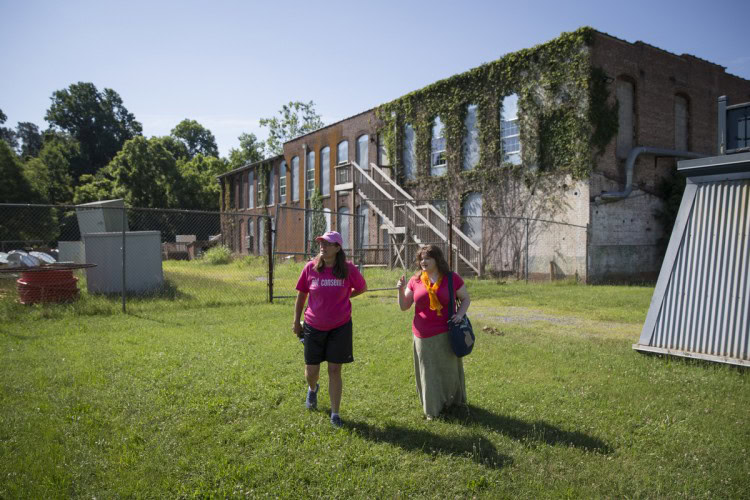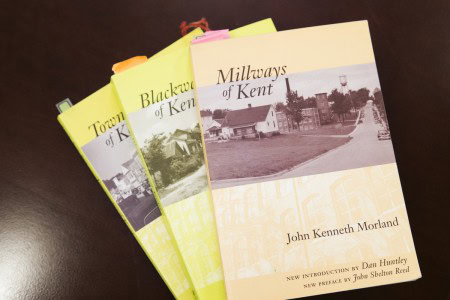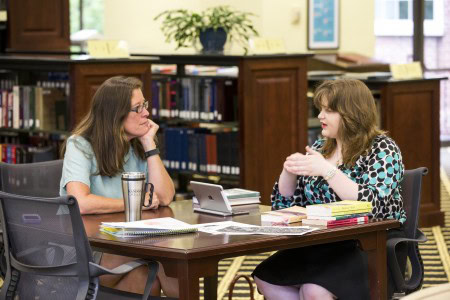Student researching sociocultural effect of mills

Danielle Currier (left) and Ayla Hagen ‘18 visit the site of a Lynchburg mill that closed in the 1950s.
Inspired by the work of a former Randolph professor, Ayla Hagen ’18 is conducting a Summer Research project that examines the socioeconomic effect of mills on their surrounding communities.
Hagen is following in the footsteps of John K. Morland, a Randolph professor who wrote Millways of Kent. The book describes the role of “Kent’s Mill,” an actual textile business Morland renamed for anonymity, in the development of a South Carolina town.
Hagen and sociology professor Danielle Currier are using this year’s Summer Research program to research the former Lynchburg Cotton Mill, which was also previously known as Consolidated Textile Corporation and the Bates Mill.
The mill, which operated from 1888 to 1957, was located near Lynchburg College and employed around 550 people at the time it closed. The buildings were demolished in 1982, and the cause of the mill’s closure is still unclear. For her project, Hagen is looking through newspaper collections and archives hoping to gain insight into the mill and the role it played in Lynchburg.
“The project is a way of trying to compare the Lynchburg mill to Kent’s Mill in order to see the impact or the social dynamics on the towns,” said Hagen. “According to newspapers from the time, the Lynchburg mill was the third or fourth largest business or industry in the city.”

Ayla Hagen ’18 was inspired by the mill research and writings of John Morland, a former professor at the College.
Hagen said it has been difficult to find information that sheds light on how the mill affected the greater Lynchburg area, but she has discovered that the mill workers formed a community of their own in many ways. That foundation, Currier added, was shaken after the closure.
“The closure affected where they lived, where they went to church, where their kids went to school, and much more,” she said.
“The business was obviously big enough to be an impact on Lynchburg, but it was still small enough that the people knew each other and they socialized and things like that,” said Hagen.
The sense of community was so strong that long after the mill shut down, the employees found ways to reunite. “They ended up having some reunions to get all the mill workers and their families back together at different times,” Hagen said. “And from the reports I’ve found, people really enjoyed it, and enjoyed being able to feel that sense of community again.”
Hagen, who grew up in the eastern plains of Colorado in the small town of Byers, said her interest in mills and the textile industry is somewhat of a family tradition. She is a seventh generation fiber artist and has immersed herself in the culture and history of the craft. As a child, she frequented the Denver Art Museum’s fiber exhibits and is a member of the Rocky Mountain Weaver’s Guild, where she has met and learned from fiber artists across the world.
“I don’t think my family ever intended to become very dedicated to maintaining a family tradition in handcrafts and textiles, but it just sort of happened,” she said. “I grew up with a lot of old quilts from my grandmas, as well as doilies and all sorts of cool things.”
She is following another family tradition by attending Randolph, since her mother is a 1992 graduate.

Sociology Professor Danielle Currier meets with student Ayla Hagen ’18 about her research on an old mill in the Lynchburg area.
“I actually grew up with a Randolph-Macon Woman’s College poster in my room,” she said. “It was always something I was aiming for in terms of college plans. It’s a great place where you can be yourself and get a great education. It wasn’t necessarily my first pick at first, but as I started looking at colleges, I realized it wasn’t just the academic program that I liked, it was the feel of the school.”
Hagen plans to declare a double major in sociology and history. After graduation, she wants to earn her Ph.D. and become a cultural anthropologist, or perhaps a college professor.
Like many of the students conducting Summer Research this year, Hagen has found the hands-on learning experience valuable.
“The element of surprise is one of the best elements of research,” she said. “When you’re going in, there are some things that you expect to find, but there are a lot of things you never imagined you’d find.”
Answers, Hagen is learning from her research on the mill, aren’t always easy to find.
“The records have been sealed for 72 years,” said Currier. “There is limited information about the mill and why it closed.”
Though details have been hard to come by, the information Hagen dug up in archived reports suggests the mill might have become antiquated. She also found that it faced competition from a mill in Danville, which might have taken away business or employees.
In initial reports about the Lynchburg mill’s closing, a newspaper article reported that even the Lynchburg mill’s administrators were surprised at the decision. Though the local newspapers indicated more information would be published as it became available, there don’t seem to be any additional articles.
“I don’t think anyone in the local area, including the people that worked for the mill, ever really suspected that they would turn around and close everything down and lay off 550 people,” said Hagen.
Hagen speculated that racial integration might have also been one of the reasons for its closure. Currier added that unionization was popular at the time and led many other businesses to close.
Hagen will present any further findings this Friday morning during the 2015 Summer Research Final Presentations.
Tags: Ayla Hagen '18, Danielle Currier, history, sociology, summer research, Summer research 2015
